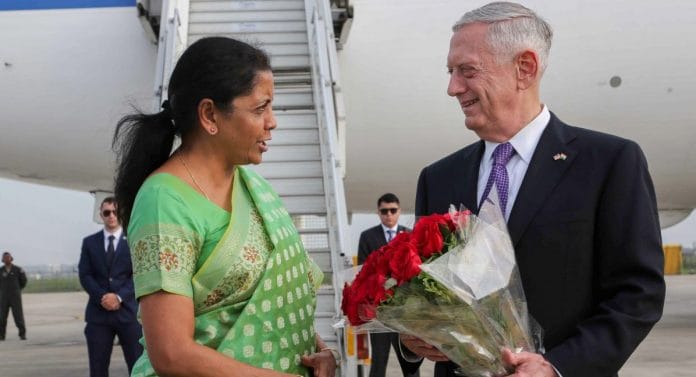COMCASA is a strategic agreement between India and US that can give us a firm footing if we play our cards well.
The signing of the Communications Compatibility and Security Agreement (COMCASA) with the US this week, gives India a series of advantages. It allows the free flow of information with enormous strategic and security implications. But at the same time, it insulates India from data transfer and sharing without New Delhi’s consent.
This agreement, part of many such ones entered into in the past, was being negotiated for almost a decade. One of the major reasons for the prolonged negotiations was the apprehension that India may have to compromise its operational independence while complying with the clauses. Although the agreement is being interpreted as giving free access to India’s trade with other countries not on the US list of similar agreements, critics say that the agreement could jeopardise India’s established military ties with Russia and access to their weapons systems. New Delhi is hopeful that the US would exclude India from sanctions on acquiring S-400 missile systems from Russia. Though the COMCASA has no direct bearing on oil imports from Iran, the 2+2 strategic dialogue is expected to ease the Iran oil import restrictions.
Also read: For the first time, India & US agree to hold wargame with army, navy and airforce
The India-US joint statement released in March 2006 (after talks between former Prime Minister Manmohan Singh and US President George W. Bush) envisaged increased opportunities for defence cooperation, information sharing, developing technologies, addressing emergent threats, working towards logistics support agreement and security issues. [Source: Changing Contours of Indo-US Relations, NIAS]
Subsequently, the Indo-US nuclear deal was signed and the discussions on the COMCASA began. Earlier in June, a team of specialists from the US held wide-ranging discussions, as part of the preparations for the 2+2 dialogue. Indian experts tried their best to allay New Delhi’s reservations on intelligence and data sharing. New Delhi was reportedly not very keen on signing two Foundational Agreements, the COMCASA, the Basic Exchange and Cooperation Agreement for Geo-Spatial Cooperation (BECA) and the Logistics Exchange Memorandum of Agreement (LEMOA).
India’s argument against the COMCASA was that the military logistics agreement between India and the US did not serve the bilateral interest enough. The US security and strategic experts seem to have relied on their defence industry to convince India about the importance of an India-specific agreement, which was earlier called Communication and Information on Security Memorandum of Agreement (CISMOA).
Also read: India, US sign landmark military communications secrecy pact at historic meeting
Indian defence experts were of the opinion that the COMCASA might result in the US gaining intrusive and unrestricted access to Indian military communications systems. In the last two decades, India has successfully developed indigenous communications systems and also deployed Russian origin platforms in high-end applications. The insistence of US experts on using US origin platforms and systems will make all these present utilities, especially the Russian supplies, redundant due to compatibility issues. Besides, the cost of US systems will be an additional burden beginning with the installation and technology transfer applications.
The COMCASA is expected to facilitate the use of secured state-of-the-art communication equipment to be installed on military communications platforms specifically and exclusively made for Indian use by US companies. The agreement provides the necessary legal framework for sale and technology transfer of such equipment to India. The US argument is that this will facilitate interoperability (meaning access to encrypted and secret technologies and/or communications) between the militaries of the two countries as well as the military communication systems of any other country that uses US origin systems for secure data links.
Also read: This $1 bn ‘Sparrow’ from US will make Delhi the first Indian city with anti-missile shield
One serious reservation expressed by Indian experts was that India will have to negotiate similar agreements with all those countries that use US systems as these are bilateral in nature and do not extend to multilateral usage.
India-US military cooperation has assumed greater salience after the collapse of the Soviet Union and China’s power trajectory in the Indo-Pacific. With increasing non-conventional threats, technological exploration of outer space as a platform for intelligence gathering and deployment of communication equipment and systems have become all the more important. Our slow start in strategic thinking, lack of articulation of strategic needs, and attendant policies have put us at the losing end of the race.
With the emergence of the Indo-Pacific region as an important part of bilateral and multilateral cooperation and increasing salience of India’s role in the region in the wake of China’s forays into the maritime zone and the ongoing ‘US-China trade war’, the COMCASA was long overdue. It is now up to New Delhi to make the best use of the agreement and maximise our advantage in the fight against terrorism and regain lost strategic space in the region.
The author is former editor of ‘Organiser’.







Comcasa also have disadvantages.
US commands over India.